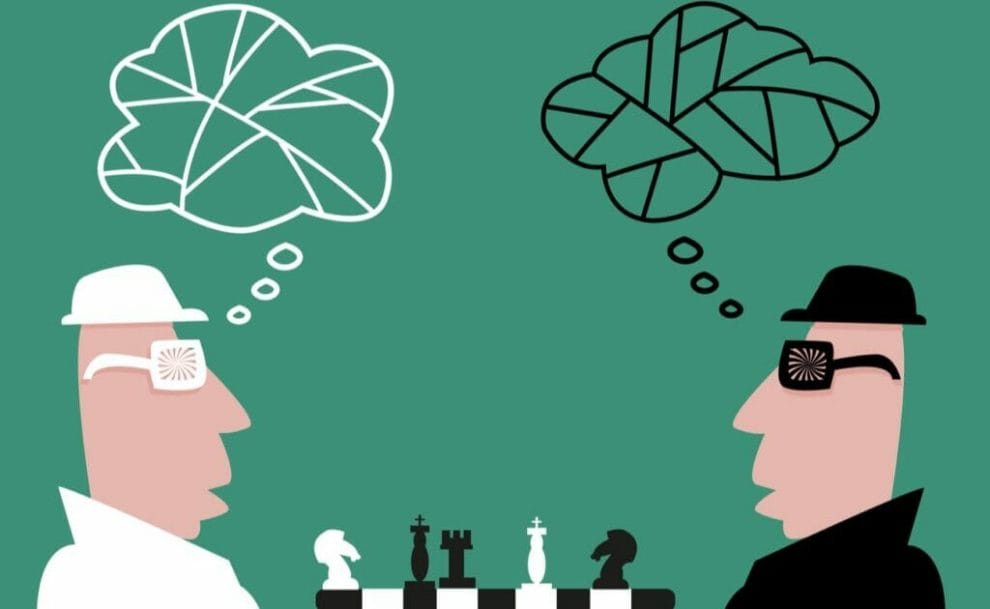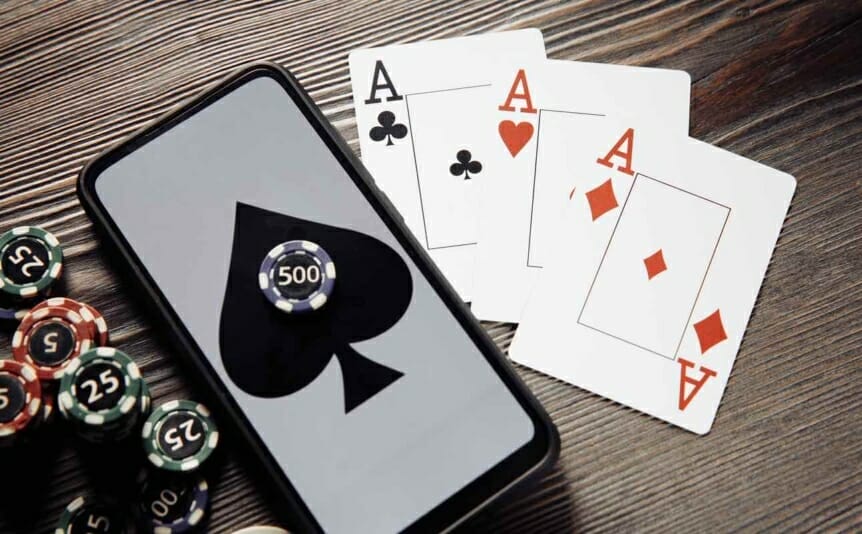
One of the biggest online poker stories of 2021 was the epic heads-up battle between Daniel Negreanu and Doug Polk. After 25,000 hands of $200/$400 Heads-Up No-Limit Hold ’em, Polk walked away with $1.2 million. The Upswing Poker founder’s victory did more than demonstrate which of the two opponents was the better heads-up player. It also brought into focus the difference between “old-school” and “new-school” theories of how to play poker. As Negreanu says in his poker blog, “It’s like night and day today from even how it was five years ago. A completely different form of poker.” A big reason for this shift is the increased use of specialized online poker software like poker solvers.
Read on to discover how online poker has changed as a result of the influence of online casino software programs.
The Birth of Modern Poker
The story of modern poker begins in 2003 when an unknown player, Chris Moneymaker, won a cool $2.5 million at the World Series of Poker (WSOP) Main Event in Las Vegas. The public was amazed by his unlikely win and poker instantly became a spectator sport. TV poker audiences grew so fast that by 2007 poker was the third most-watched sport in the US. The number of WSOP entrants increased tenfold, from 839 in 2003 to 8,773 in 2006, as new players sought the opportunity to win big.
At the same time, online poker sites attracted hundreds of thousands of visitors. Inevitably, some saw the chance to go pro and make a living playing poker online. But the new school of online players viewed the game differently from the old-school live poker pros. Instead of playing the player, the new generation adopted a more mathematical approach based strictly on probabilities and odds. They also played a lot more poker.
For instance, when 18-year-old Norwegian sensation Ann Obrestad won $1 million online, she’d already played in thousands of online poker tournaments. Compared to that, most professionals at the time were only playing in about 60 live poker tournaments a year.
Game Theory
The primary mathematical tool used in new-school thinking is game theory, which analyses situations by means of a concept called the “Nash equilibrium.” Named after Nobel Prize-winner John Nash, played by Russell Crowe in the movie A Beautiful Mind, a Nash equilibrium refers to a situation in which all players make optimal choices, given their opponents’ choices. A poker player using game theory considers their own cards, their opponents’ cards and how they intend to play them before choosing when and how much to bet. The idea is that if you apply a Game Theory Optimal (GTO) strategy, you’ll lose less money in the long run.
By contrast, old-school poker emphasizes practical experience, intuition, body language, psychology and other non-mathematical factors.

GTO Poker Solvers
The perfect GTO strategy doesn’t yet exist. There are so many possible starting hands and community card combinations (1,326 and 254,251,200, respectively) that even the most powerful computers struggle. But that didn’t stop the new generation of players from turning GTO strategy to their advantage. They started using online poker solvers to come up with GTO strategies for specific situations.
With a poker solver, you enter key data, including community cards, cards opponents could be holding, stack sizes permitted, bet sizes and number of betting rounds to go. Then the software provides GTO strategies for that specific situation. Of course, this makes for an excellent learning opportunity as you try to figure out the logic behind the proffered strategy, identify underlying patterns and answer questions like how often to bet and what hand types to bet on.
Poker solvers don’t offer a silver bullet, but they can be a big help when it comes to poker tournament strategy. An entire poker training industry has grown up as a result, with courses and apps offering to teach players how to play poker in line with GTO strategy and using both online and live casino software.
Tracking the Changes
The trend toward GTO strategy has had a visible impact on the game. First, bluffing has become much more aggressive. GTO shows that the old-school strategy of betting primarily good hands with minimal bluffing is wrong. According to game theory, you should be twice as likely to have a weak hand as a strong hand on the flop. This means that bluffing forces your opponents to call often to stop you winning with weak hands, so when you have a strong hand, you’ll win a lot. Also, many weak hands can improve on the turn and the river.
Second, GTO strategy helps with short-stack play. The bottom-line question, “Do I go all in or do I fold?” game theory advises on exactly when to go all in and which hands to fold. Memorize these recommendations and you’ll have an advantage over old-school rivals who rely on feel.
Third, new-school players tend to mix their strategies, sometimes even making random choices. This avoids becoming too predictable and can throw off opponents who use tracking software to analyze your play and weaknesses when you play poker online.
Thanks to these revolutionary software-driven strategies devised by the best online poker software, professional online poker players are making millions from poker tournaments.
AI, the New Frontier
Artificial Intelligence (AI) is the most recent software development to have impacted the world of poker, both in terms of gameplay and training. Here are a few ways in which this new software frontier is changing the online game.
AI vs. human play
In recent years, AI programs have achieved unexpected victories against professional poker players. Notably, an AI called Pluribus, developed by Facebook’s AI lab and Carnegie Mellon University, was able to defeat a number of world-class poker pros in multi-player Texas Hold’em. This has deepened people’s understanding of how AI can handle complex decision-making tasks but also shone a light on the fact that, in the future, humanity’s main competitors may not be human.
Learning Tools
AI has become a valuable tool for learning and practicing poker. Training programs powered by AI or machine learning can provide tailored advice to players based on their strengths and weaknesses, helping them to improve faster.
Data Analysis
AI can analyze massive amounts of poker game data to uncover patterns and strategies that might be missed by human players. This can lead to new insights about the game and potentially shift established strategies.
Game Integrity
AI can also help maintain the integrity of the game. For example, online poker platforms can use AI to detect and prevent cheating or collusion among players.
As with any revolutionary technology, AI in poker is not without its detractors. Many fear that the use of AI bots in online games can lead to an unfair advantage and there are ongoing debates about how and to what extent they should be allowed in online poker.
Play Poker Online Your Way at Borgata Online
Whether you’re a new-school GTO strategy buff who keeps up with current technology trends or a more old-school player who yet has to understand augmented and virtual reality gaming, you’ll get the poker experience you’re looking for at Borgata Online. Register to join the growing community (40,000 and counting) for daily cash games, sit and goes and online poker tournaments geared toward your style, experience and budget. These include satellite tournaments that could get you started on the road to the WSOP.
You’re always in with a chance at Borgata Online.
